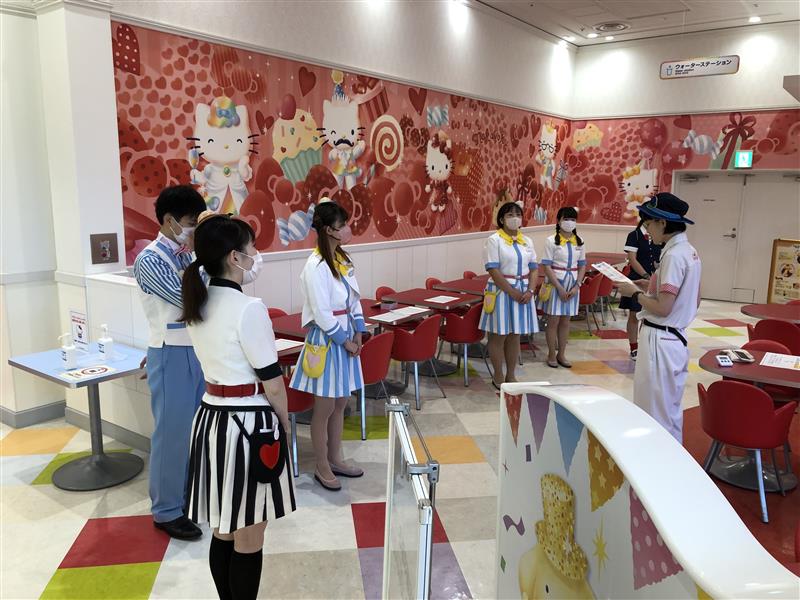Basic Approach
In accordance with “4. We will abide by the law.” in “2. Principles” of the Sanrio Compliance Charter, the Group develops and provides products and services in compliance with laws and regulations and with safety as our top priority.
We have established the Sanrio Quality Standards for our products, and our first priority is to develop safe and reliable products based on the quality standards established for each category.
Structure and Governance
Products developed by Sanrio’s headquarters are managed based on the Sanrio Quality Standards by the Quality Control Section established within the Merchandise Department.Standards are set for individual products based on product specifications during the planning and development stages. We check prototypes based on these standards and conduct further checks of mass-produced products during production. Products are sampled and inspected at the warehouse prior to going on sale. Past quality issues and rejected samples are recorded in the database and checks are conducted to prevent recurrence.
If a product-related accident occurs, the Product Safety Measures Committee considers the response based on internal accident guidelines. Reports are then submitted to the Sanrio Joint Compliance Committee and Board of Directors. To ensure safety management at theme parks, health and safety meetings and safety meetings are held once a month at each park’s office.
Product initiatives
Quality inspections
The Sanrio Quality Standards which form the basis of our quality control activities are formulated in accordance with the following laws and regulations.
- Japan:Food Sanitation Act, Household Goods Quality Labeling Act, Consumer Product Safety Act, Misleading Representation Act, Pharmaceutical and Medical Device Act, Electrical Appliance and Material Safety Act, Radio Act, and the Safety Toy, Safe Goods, and Japanese Industrial Standards
- USA:CPSIA, FHSA, FDA, FCC, ASTM (F963, etc.), and state laws (California Proposition 65, etc.)
- Europe:REACH, RoHS, R&TTE, EN (71 etc.)
Sanrio outsources the manufacturing of our products to Group companies and partner manufacturers, and the cooperation of our contractor companies is indispensable for quality control. In FY3/2025, we will actively visit these Group companies and partner manufacturers and increase visits to the actual manufacturing sites. Through these initiatives, we will deepen our understanding of the manufacturing sites and work collaboratively to advance quality improvement activities.
Management of products that use needles in the manufacturing process
A stray needle left in a product from the production process can result in serious accidents. As such, we collaborate with our manufacturing contractors to strictly manage needle usage in accordance with the Sewing Factory Survey. In the survey, manufacturers report on the workflow for inspections for residual needles, needle management and traceability status, needle inspection steps, and the storage conditions for semi-finished and finished products. We also require the submission of actual needle samples.
Improving quality with a defect point system
Sanrio conducts a point system for product defects with its manufacturing contractors with the aims of preventing defects and improving product quality. Applying a point system to incidents of defects provides a basis for semiannual interviews with suppliers that enables the establishment of effective inspection standards for improving product quality.
Quality control of products for overseas markets
Products exported to overseas markets must comply with the laws and regulations of each country, which may be different than those in Japan. For example, the Consumer Product Safety Improvement Act (CPSIA) in the United States has strict regulations on lead and phthalate content in products for children under the age of 12. Many countries also have individual regulations, such as the REACH and EN71 standards in Europe and ISO8124 in many countries in Asia, and others with mandatory certification requirements, such as the GB6675 toy safety standards and China Compulsory Certification (CCC) in China and the Korean safety certification (KC) in South Korea.
We have therefore established separate quality standards for export products and, in addition to ensuring products meet our internal quality standards, we engage external inspection organizations to ensure product safety.
Quality and safety training
Quality and safety training is provided to employees working in the Quality Control Section and at Sanrio Shanghai. We held nine training sessions in FY3/2025. The training mainly shares incidents of defects and products rejected during overseas inspections.
Initiatives for theme parks and services
Quality and safety management at Sanrio Puroland in Tama, Tokyo and Harmonyland in Hiji, Oita Prefecture focus on safety related to both equipment and people so visitors can enjoy the Sanrio world with complete confidence and peace of mind about their safety and the quality of their experience.
Facility safety management
- Ride attractions receive regular inspections in accordance with legal requirements.
- Water park equipment and operations comply with Ministry of Economy, Trade and Industry safety guidelines for water park facilities.
- A facility inspection, site inspection, and post-installation inspection are conducted when equipment is newly installed or renovated.
- Comprehensive disaster response and evacuation drills are conducted annually, and small evacuation drills are conducted monthly.
- A Safety Management Section was established within the organizational structure of Sanrio Puroland. This section cooperates with Harmonyland on safety management for all facilities.
Guest services safety management
- Morning meetings, new employee and skill improvement training, and on-the-job training at various sites are conducted following established process manuals.
- Customer satisfaction surveys and communication cards are used to monitor the quality of our services and as a basis for improving services.
